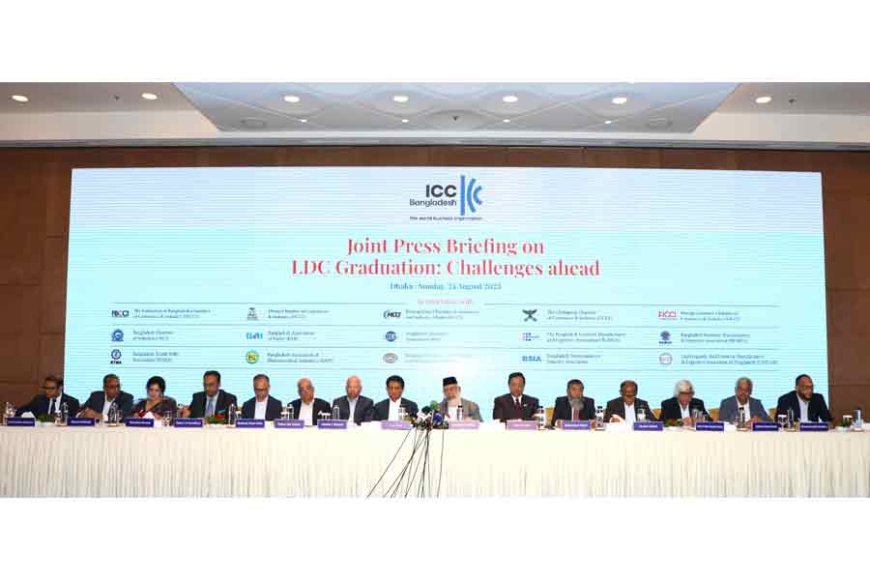Business leaders urge 5–6 year deferment of LDC graduation
Business leaders urge 5–6 year deferment of LDC graduation

What's Your Reaction?







Join our subscribers list to get the latest news, updates and special offers directly in your inbox

Leaders of the country’s major business and trade organisations on Sunday jointly called for postponing Bangladesh’s scheduled LDC graduation by five to six years.
“Our entrepreneurs and chambers fully support the graduation process,” said Mahbubur Rahman, president of the International Chamber of Commerce (ICC) Bangladesh. “But we believe a three- to five-year extension is essential,” he added at a press briefing in Dhaka.
The conference, titled “LDC Graduation: Challenges Ahead,” was organised by ICC Bangladesh in collaboration with FBCCI, DCCI, MCCI, CCCI, FICCI, BCI, BAB, BIA, BGMEA, BKMEA, BTMA, BAPI, BAPLC, BSIA, and LFMEAB.
Rahman noted that Bangladesh has already met all three UN thresholds — GNI, Human Assets Index, and Economic Vulnerability Index — in two consecutive reviews, setting the country on course to exit the Least Developed Country (LDC) category in November 2026.
“This is a matter of national pride, reflecting our resilience, growth, and industrial advancement over the past five decades,” he said. But he cautioned that while the business community welcomed graduation, careful preparation was critical for a smooth and sustainable transition.
“Graduation brings not just opportunities but also risks,” he warned, citing the possible loss of duty-free market access in major export destinations. Tariffs of up to 12 percent could reduce exports by 6–14 percent, he explained.
Rahman also highlighted the loss of WTO special and differential treatment, including export subsidies and relaxed TRIPS rules. “Stricter patent enforcement will raise compliance costs and impact the pharmaceutical sector,” he said. Currently, Bangladesh’s pharmaceutical industry meets 98 percent of domestic demand and exports to over 150 countries. Without a TRIPS waiver extension, essential drugs — including cancer and antiviral medicines — would become unaffordable, hurting both healthcare and exports.
He pointed out that several countries had previously delayed their LDC graduation, showing it was not unusual to seek more time when structural reforms, trade deals, and infrastructure readiness were still pending.
The proposed deferment, Rahman argued, would allow Bangladesh to conclude trade agreements with the EU, UK, ASEAN, and Gulf states, offsetting potential tariff shocks from the US.
Responding to questions, Rahman confirmed that business associations would jointly submit a formal proposal to defer graduation. “The question is not whether Bangladesh graduates, but how it does,” he stressed.
For a successful transition, he listed key priorities: securing market access through proactive trade diplomacy, boosting competitiveness via technology and skills, accelerating infrastructure development, reforming the financial sector, improving ease of doing business, diversifying energy sources, and building a strong global brand.
“If managed wisely, graduation can be turned from a challenge into an opportunity, helping Bangladesh become a competitive middle-income economy by 2031,” Rahman said.
“Graduation is inevitable, but success will depend on how quickly and collectively we act,” he concluded.
The event was attended by top leaders from BAPLC, LFMEAB, BCI, BIA, BKMEA, MCCI, BAB, BGMEA, DCCI, FICCI, BAPI, and BSIA, among others.







Suvradas Dec 29, 2025 0
